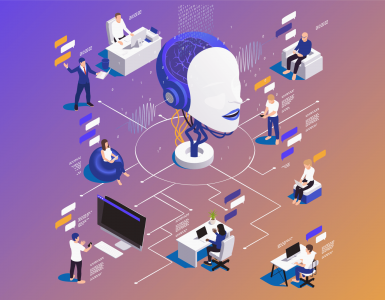It’s no secret that organizational culture impacts company success as well as employee satisfaction. A positive culture of shared values and healthy workplace behavior enables and empowers employees and managers to be engaged, driven, and loyal. Strong organizational culture also attracts a talented workforce. Nearly 77% of candidates look at the workplace culture before applying for a job, according to a report by Glassdoor. This suggests that a negative perception of an organization’s culture can make it challenging to fill open positions and retain top talent.
While instilling culture across the organization is a challenge in any setting, the COVID-19 pandemic underscored its importance as it significantly impacted productivity and forced leadership to evolve to the new normal. Their reassessment and reevaluation either strengthened the work culture or diluted it. Nevertheless, be it a fully remote workforce, or a distributed team working on a follow-the-sun model, culture is key to creating a sense of genuine connectedness and belonging.
Increased stress, lopsided work-life balance, isolation and job insecurity have all contributed to lower productivity of distributed teams and remote workers in recent times. This is only compounded by company culture that is transactional rather than relational. In fact, companies that managed to instill positive organizational culture, offering their workforce flexibility and transparency, saw big gains. Not only are 68% of teams evaluating their culture to better reflect the new normal, but 62% of remote and hybrid employees and 52% of on-site employees said that their workplace culture had a positive impact on their work as per a 2021 report by Gartner.
Here’s a deep dive into the challenges and means of scaling organizational culture in a globally distributed workforce.
Challenges of building workplace culture in distributed workforce
Fragmented and dispersed workforce
One of the ways to cultivate workplace culture is through shared experiences. In the past, these took shape as shared learning seminars and other such in-person activities. Unfortunately, due to the pandemic, such interactions aren’t as frequent or are fully digital when they occur, and thus lacking in one way or another. This makes building and enforcing a strong work culture challenging in a distributed workforce.
Too much transparency in the workplace
While transparency is essential, especially now, too much is problematic. Companies with an overly transparent culture often face issues of over-sharing, which in turn hampers the ecosystem. For instance, too much transparency about financial struggles, losses or even salaries can lead to unrest, detrimental competition and even unwarranted dismissals.
Increased pressure for productivity
Spurring productivity, while essential to any organization, is among the hurdles companies will likely face when building the right culture. Both managers and employees can make it difficult to set the right values or even act in accordance with them when there is pressure to boost productivity. According to research, 50% of senior leaders stated that this type of pressure is one of the biggest challenges in creating a positive culture.
How organizations can build a strong culture in a globally distributed workforce
Be intentional about culture and celebrate cultural differences
Having a set of principles or values that leaders and the top tier of management believe in and act on, is step 1. Bringing up workplace culture from onboarding and throughout the employee work cycle is key to it being taken seriously. While it is important to have a culture that all employees can share, it is also important to accept and honor diversity. An empathetic culture is mission critical in a globally distributed workforce, since companies are now expected to be diverse. According to this study, 84% of the CEOs said empathy drives better outcomes; the same study also said that 90% of GenZ employees are more likely to stay if the organization has an empathetic culture.
Leverage technology to better communicate and collaborate
Communication and collaboration are critical tools that support organizations in building desired workplace culture. Remote working can have a negative impact on both of these and active measures to counteract such gaps must be put in place. Organizations can assign mentors to the new hires, have online team huddles, and upgrade to technology that streamlines communication. Only through effective communication can the values be imparted into every sector and silo of the workforce.
Lead by example
Actions speak louder than words. For culture to truly set in, the organization’s values must be actioned by top management and the board of directors. Leaders should believe in what they say and do to get the desired results. On the other hand, leaders acting in opposing directions can create distrust among the employees, which then further deteriorates into a negative perception of the workplace. Simply put, when it comes to building the right culture, a ‘Be. Do. Say.’ style leadership is necessary.
Apart from the above measures, organizations should also rely on the in-country experts when managing a distributed workforce. This means that even though company values would be at the forefront in communication between employees, in-country experts should be at the forefront in matters concerning monetary and non-monetary compensation. This is because there are different customs and laws that come into play.
Dependency on the experts here can help with compliance and stronger culture. Talent500 can help you build and grow your global workforce in a seamless way with our AI-powered tools. Request a consultation now to know how we can help you manage your workforce, stay compliant, and engage with employees to cultivate a strong culture.






Add comment